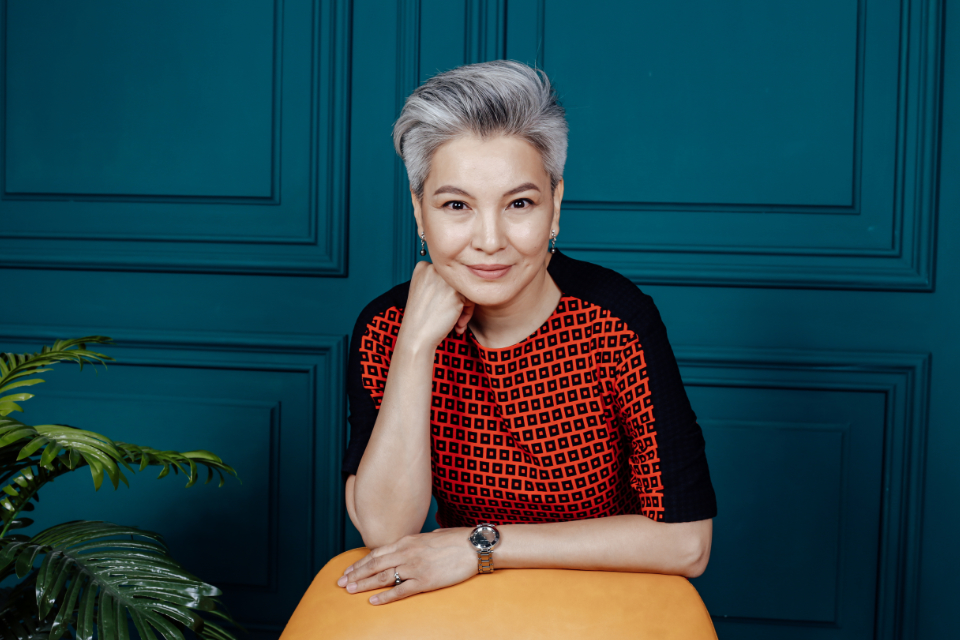Age: 46
Origin: Kyrgyzstan
Based in: Bishkek, Kyrgyzstan
Education: Kyrgyz State University of Construction, Transportation and Architecture, Kyrgyz State National University & University of Illinois at Springfield
Occupation: Founder & Director General – Aha.kg
Before using her entrepreneurial skills to start Aha.kg in 2017, Aigul Dogdurova spent 15 years working for international organisations such as the Soros Foundation, the UNDP and USAID. During those years, she became an expert on youth policy, community development and public administration.
Dogdurova’s experience working on youth policy in her native Kyrgyzstan led her to realise that personal development and soft skills were essential for the advancement of Kyrgyz society. Soon the idea for Aha.kg appeared when Dogdurova “had an ‘aha’ moment on why Kyrgyz society doesn’t change much despite all the investments into development programmes. The only reason is a mindset, which we have as a result of the authoritarian style of parenting and education, especially in Kyrgyz-speaking communities,”
Aha.kg offers educational courses for adults and children in subjects such as interpersonal and family communication, goal setting and achievement, conflict prevention and resolution, emotional intelligence, stress management, public speaking, media literacy, creative thinking, and financial literacy. Aha.kg also provides a platform for those who are ready to share their knowledge and experience and to directly address the audience through their website, YouTube channel, and Facebook page. The uniqueness of Aha.kg is that it offers courses in Kyrgyz, which is important for the development of rural Kyrgyz-speaking societies which previously would have had to rely on Russian-language courses.
Dogdurova enjoys the challenges and professional growth that come from being an entrepreneur. She wants to expand and adapt her business to other Central Asian nations and wants to make sure that the knowledge Aha.kg offers is accessible to all post-soviet countries and available in the local language.
“I am 100 per cent confident that knowledge about soft skills and personal growth is needed in all post-soviet countries, but very much in Central Asian countries. Thus, I would grow Aha.kg in all countries in the region to make this knowledge available in their local languages,” Dogdurova said.
In the next five years, Dogdurova plans for Aha.kg to conduct training courses for 100,000 people and change the mindset of one million Kyrgyz citizens.
Among the first projects of Aha.kg were the “E-learning accelerator”, “Z-Academy for Kyrgyz-speaking adolescents in soft-skills” and the “Kesip Kerbeni” project, in which a self-assessment was carried out for career guidance in boarding schools. Thanks to the success of these projects, Dogdurova received business proposals from large organisations, including the Soros Foundation-Kyrgyzstan, the U.S. Peace Corps in the Kyrgyz Republic, the Representative Office of Internews Europe, and the German Society for International Cooperation (GIZ).
Despite her start-up having sufficient financial support, Dogdurova still experienced difficulties in the beginning due to cultural barriers and limited access to information.
“In Kyrgyzstan, especially in Kyrgyz-speaking communities, people are not used to paying for additional education, especially soft skills, which are not part of formal education. But things have changed and now we have our niche … my advice is to just start, it is a great way to open your eyes to your environment and yourself,” she said.
Another difficulty for Aigul was low level of sales. There was a huge demand from her customers for free content, but they were reluctant to pay for the product. This pushed Aigul to seek professional support.
“I have a lot of experience in many areas, but absolutely no experience in running a business. I started to turn to organizations that supported small businesses. Unfortunately, the requirements were quite high, and my start-up did not fit their selection criteria. I continued to search and saw the PEAK ad on social media. My start-up met the criteria for the PEAK acceleration program, I loved it! ” – Aigul Dogdurova shared.
By becoming a member of the business growth acceleration programme of the PEAK Bishkek Business Innovation Development Centre, Dogdurova successfully mastered the basic skills of running a commercial project. She also received business advice from leading experts in sales and marketing. As a result, Aigul identified the main problems hampering her business and improved her B2C sales strategy. As a result of the business programme, Aha.kg’s direct sales rose to 90% and its customer base expanded with buyers coming from Russia, Ukraine, Germany, Malaysia and Turkey.
The COVID-19 pandemic also brought significant disruptions to all Aha.kg’s offline activities and Dogdurova and her team stepped up their online training.
In addition to developing her own business, Dogdurova is also highly involved with events and organisations which encourage young Kyrgyz people to develop their businesses and entrepreneurship. Dogdurova participated in the U.N. Women’s Entrepreneurship Expo in April 2021. This expo was intended to connect, create, and accelerate business ideas and growth for female entrepreneurs amid the COVID-19 pandemic.
Dogdurova was also one of the expert speakers who gave a master class at “IdeaFEST: from ideas to implementation” which was held online between 7-11 September 2020. The IdeaFEST festival is a platform for enterprising young people between the ages of 18-30 living in Kyrgyzstan, Kazakhstan, Uzbekistan, and Tajikistan where they can increase their potential for the development and implementation of various projects, receive mentoring support from renowned experts and turn their ideas into full-fledged projects. In addition, participants learn to present themselves to a wide audience, through which they can find partners or investors for their business ideas in the future. The participants of the festival were challenged to create innovative ideas aimed at solving socially significant problems.
Quote: “It is necessary to work on the formation of the personality of young people, our problem is that we ourselves decide what young people should do, sometimes we need not interfere with their choice.”

